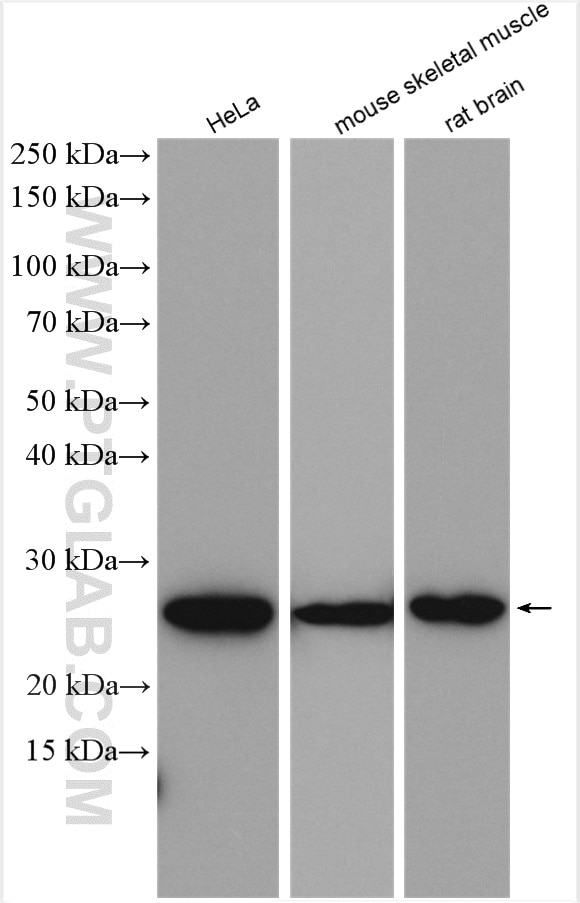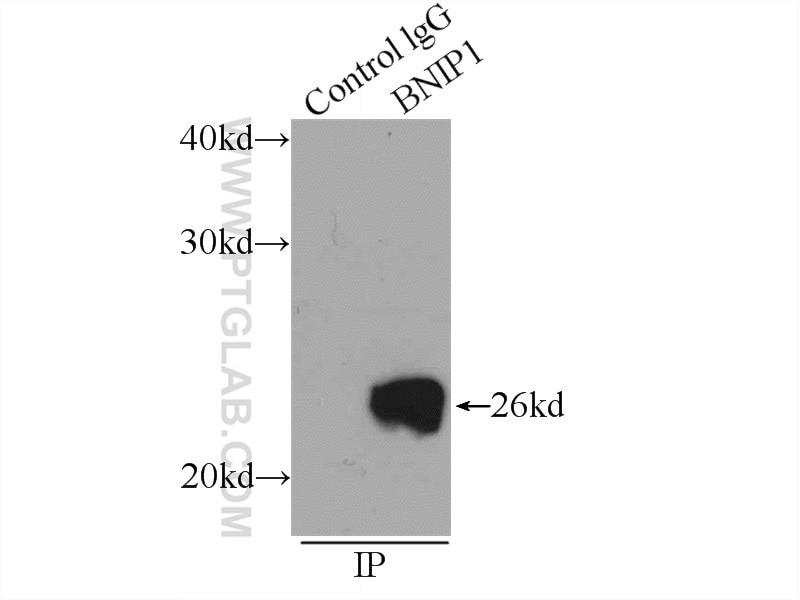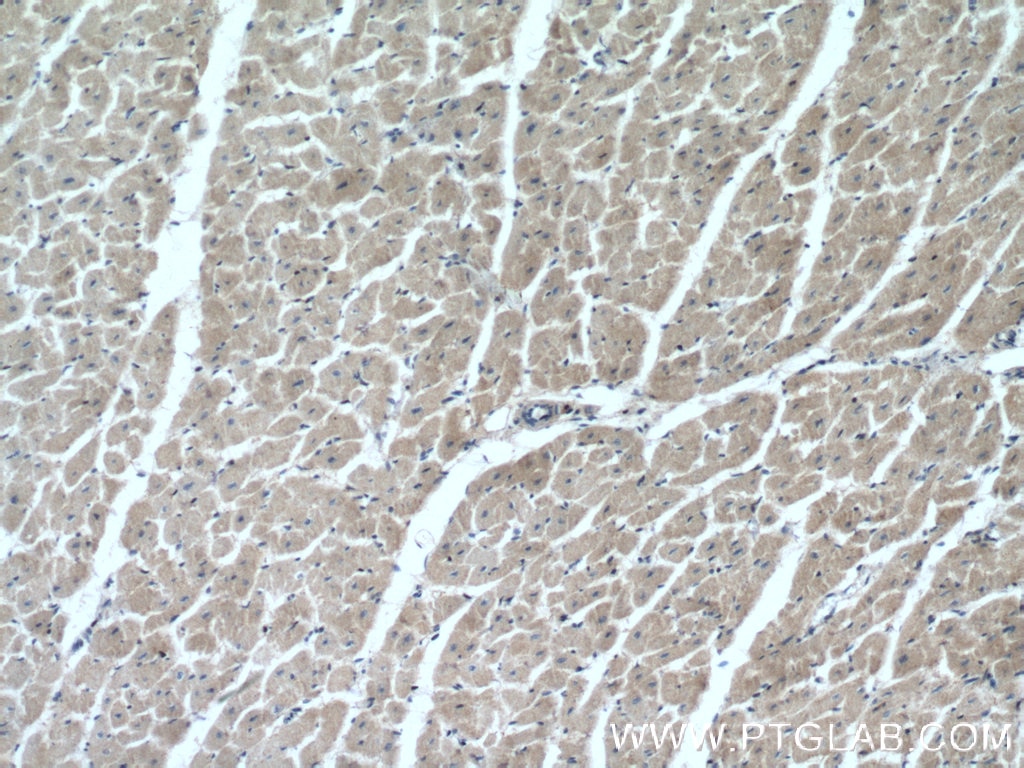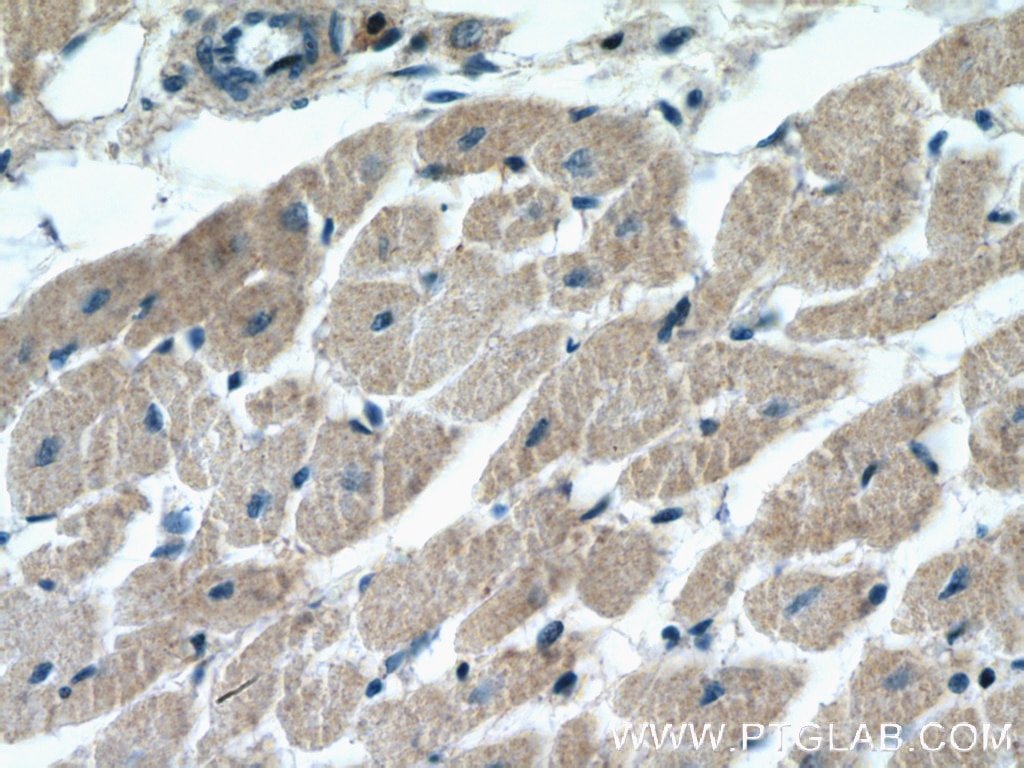Tested Applications
| Positive WB detected in | HeLa cells, mouse skeletal muscle tissue, rat brain tissue |
| Positive IP detected in | mouse brain tissue |
| Positive IHC detected in | human heart tissue Note: suggested antigen retrieval with TE buffer pH 9.0; (*) Alternatively, antigen retrieval may be performed with citrate buffer pH 6.0 |
Recommended dilution
| Application | Dilution |
|---|---|
| Western Blot (WB) | WB : 1:500-1:2000 |
| Immunoprecipitation (IP) | IP : 0.5-4.0 ug for 1.0-3.0 mg of total protein lysate |
| Immunohistochemistry (IHC) | IHC : 1:50-1:500 |
| It is recommended that this reagent should be titrated in each testing system to obtain optimal results. | |
| Sample-dependent, Check data in validation data gallery. | |
Published Applications
| WB | See 3 publications below |
| IHC | See 1 publications below |
| IF | See 3 publications below |
| IP | See 1 publications below |
Product Information
15964-1-AP targets BNIP1 in WB, IHC, IF, IP, ELISA applications and shows reactivity with human, mouse, rat samples.
| Tested Reactivity | human, mouse, rat |
| Cited Reactivity | human, mouse |
| Host / Isotype | Rabbit / IgG |
| Class | Polyclonal |
| Type | Antibody |
| Immunogen | BNIP1 fusion protein Ag8737 Predict reactive species |
| Full Name | BCL2/adenovirus E1B 19kDa interacting protein 1 |
| Calculated Molecular Weight | 228 aa, 26 kDa |
| Observed Molecular Weight | 26 kDa |
| GenBank Accession Number | BC010959 |
| Gene Symbol | BNIP1 |
| Gene ID (NCBI) | 662 |
| RRID | AB_2066636 |
| Conjugate | Unconjugated |
| Form | Liquid |
| Purification Method | Antigen affinity purification |
| UNIPROT ID | Q12981 |
| Storage Buffer | PBS with 0.02% sodium azide and 50% glycerol pH 7.3. |
| Storage Conditions | Store at -20°C. Stable for one year after shipment. Aliquoting is unnecessary for -20oC storage. 20ul sizes contain 0.1% BSA. |
Background Information
BNIP1 is a member of the BCL2/adenovirus E1B 19 kDa-interacting protein (BNIP) family. The encoded protein is predominantly localized to the endoplasmic reticulum (ER), is a pro-apoptotic Bcl-2 homology domain 3 (BH3)-only protein. BNIP1, also called SEC20L, is a component of a SNARE complex consisting of STX18, USE1L, BNIP1/SEC20L and SEC22B which is involved in apoptosis and ER membrane fusion. Recent reports showed that expression of BNIP1 induced mitochondrial fragmentation in a BH3 domain-dependent manner via increasing dynamin-related protein 1 (Drp1) expression. RNF185 is a mitochondrial ubiquitin E3 ligase that regulates selective mitochondrial autophagy, BNIP1 colocalizes with RNF185 at mitochondria and is polyubiquitinated by RNF185 through K63-based ubiquitin linkage in vivo and modulatemitochondrial homeostasis through autophagy.
Protocols
| Product Specific Protocols | |
|---|---|
| WB protocol for BNIP1 antibody 15964-1-AP | Download protocol |
| IHC protocol for BNIP1 antibody 15964-1-AP | Download protocol |
| IP protocol for BNIP1 antibody 15964-1-AP | Download protocol |
| Standard Protocols | |
|---|---|
| Click here to view our Standard Protocols |
Publications
| Species | Application | Title |
|---|---|---|
Cell Signal A novel RING finger E3 ligase RNF186 regulate ER stress-mediated apoptosis through interaction with BNip1. | ||
Hum Mutat A homozygous hypomorphic BNIP1 variant causes an increase in autophagosomes and reduced autophagic flux and results in a spondylo-epiphyseal dysplasia. | ||
PLoS One RNF185, a novel mitochondrial ubiquitin E3 ligase, regulates autophagy through interaction with BNIP1. | ||
J Biol Chem Comparative proximity biotinylation implicates the small GTPase RAB18 in sterol mobilization and biosynthesis | ||
Transl Oncol Generation of a competing endogenous RNA network and validation of BNIP1 expression in the lung of irradiated mice |









